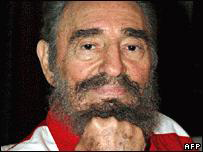
|
 |
 |
 News from Around the Americas | January 2008 News from Around the Americas | January 2008  
Ailing Cuban Leader Again Hints at Retirement
 Pam Democrat Pam Democrat
go to original


| | Fidel Castro | | |
Cuba's ailing President, Fidel Castro, has for the second time in recent weeks alluded publicly to the possibility of retiring from office. In a letter read out to Cuba's National Assembly, he said in the past he had been a person who "clung" to power, but that life had changed his perspective.

The 81-year-old communist leader wrote that he had a duty not to obstruct the rise of younger people.

"My basic duty is not to cling to office, and even less to obstruct the path of younger people, but to pass on the experiences and ideas whose modest worth stems from the exceptional era in which I have lived."

Mr. Castro has ruled Cuba since leading a communist revolution in 1959. He handed temporary power to his 76-year-old brother in July 2006 after undergoing emergency intestinal surgery, and has not been seen in public since.

Cuba's acting leader, Raul Castro, sat next to the empty chair of his ailing brother at the final session of the National Assembly before next year's parliamentary election.

In a letter read out before the day's business got underway, Fidel Castro said that in the past he had been a "utopian socialist". It was a phase, he said, when he believed he knew what we had to do and wanted the power to do it.

"What changed me? Life itself, through the deepening of the thoughts of [Cuban independence leader Jose] Marti and the classics of Socialism," he said.

Mr. Castro also urged people to support his brother, saying he had read in advance a speech Raul made earlier this week in which he said Cuba needed to become more democratic, at least by allowing more open debate about economic and social issues.

"It is necessary to continue marching without stopping for even a minute. I will raise my hand next to yours to support him," he added in the letter dated 27 December.

The remarks were the first time that Mr. Castro has publicly backed his brother's attempts at reforms, but there is no talk yet of any political changes in the one-party state.

Mr. Castro's two messages come before elections on 20 January to elect the National Assembly, which then selects the Council of State, which he has headed since 1976.
Candidates in Cuban General Election Show Increase in Younger Nominees Listed
RHC-ACN
go to original

Havana - According to an online article published in Granma Friday, the list of candidates to be voted on in the January 20 general elections in Cuba, show an increase in the number of young people standing for election.

Of the 614 candidates for the parliament, 374 (60.91 percent) were born after the triumph of the Revolution in 1959. Another 134 (21.82 percent) were under the age of ten. Only 106 candidates (17.25 percent) experienced capitalism in Cuba.

After expressing their interest in running for election, the candidates were proposed by the electoral commissions from the 169 municipal assemblies (city councils) based on the careers and human qualities of the possible candidates before submitting them to the people for the January 20 vote.

In terms of continuity and renewal, 36.78 percent of the candidates (224) are incumbents in the current 609 member legislature. Therefore, a little over 63.22 percent (385 legislators) will be newcomers in the new legislature of 614 members with the additional 5 members reflecting population growth.

The number of candidates speaks for itself in terms of equality. 42.16 percent of the candidates (265) are women, 118 of the candidates are black and 101 are mestizos. The majority (481) of candidates have university level education (78.34 percent) and 127 (20.68) have a high school and/or technical degrees. | 
 | |
 |



